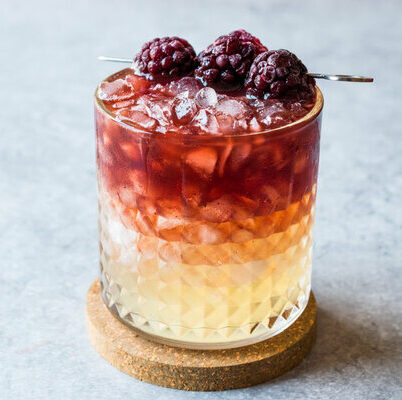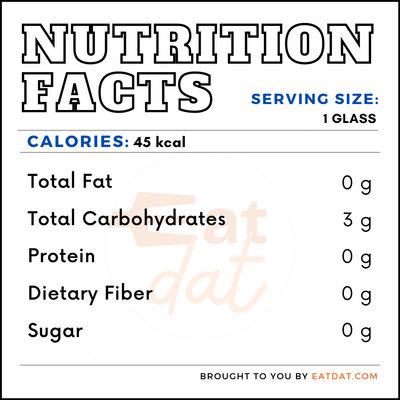
Bramble
What is Bramble?
The Bramble is a cocktail of British origin, consisting of gin, lemon juice, sugar, and crème de mûre, which is a blackberry liqueur. It is often garnished with sliced fruit, including a lemon slice. As it is more easily available, crème de cassis may substitute the crème de mûre.
- The cocktail has a balance of sweetness and sourness and has a classy red color with crushed ice at the top.
- It is an end of summer cocktail, as that is when fresh blackberries are easily available.
Some of the most popular British cocktails are:
- Pimm’s
- Gimlet
- Bramble
- John Collins
- Espresso Martini
- Vesper
- Buck’s Fizz
Origin
The Bramble was created by Dick Bradsell, bar manager at Fred’s Club in Soho, London, which was a popular place in the 1980s. Bradsell wanted to create a truly British drink but it eluded him because he didn’t want to use lemons, which were not native to England. He also felt that there was no acceptable crème de mûre of British origin, and he felt he didn’t achieve his goal. His customers would bring him products to try out and on receiving a bottle of crème de mûre from France, he borrowed a crushed ice machine from the restaurant next door and created this classic cocktail.
Nutrition
Nutritional profile for Bramble (1 glass):

Gin has no nutritional value and without any vitamins and minerals, has empty calories. However, lemon juice contains plenty of different flavonoids and phenolic compounds, which are powerful antioxidants. Also, lemon juice contains decent levels of calcium, iron, phosphorus, potassium, selenium, folate, choline, vitamin C, vitamin A, lutein, and zeaxanthin, all of which are essential for good health. Additionally, regular consumption of lemon juice can help in lowering the risk of stroke, cancer, and asthma, while increasing iron absorption, immune system functioning, and weight loss.
Sugar can be good for the health of the brain, provided it is consumed in balanced quantities. Overconsumption of sugar can lead to an increase in the risk of heart diseases, diabetes, cancer, and other diseases. Additionally, it can lead to obesity, depression, and aging. It is very important to limit consumption of sugar in order to ensure that both mind and body are functioning properly.
Commercial production
To prepare the Bramble, the ingredients required are gin, lemon juice, sugar, and crème de mûre. First the gin, lemon juice, and sugar syrup are added into a cocktail shaker along with ice and shaken well. Crushed ice is very important to this cocktail because it helps in the dilution of the drink and enhances its flavor. Then, a rocks glass is filled with this crushed ice and the shaken liquid poured into it. After that, the crème de mûre is finally drizzled onto the ice, allowing it to trickle through. The cocktail is usually garnished with blackberries or a slice of lemon.
Bramble recipes
This is a classic cocktail and is still popular in bars around the world. Here are a few recipes to try:
- Bramble
- Ginger Bramble
- B&G Bramble
- Blackberry Bramble Cake
- Blackberry Gin Gimlet Cupcake
- Lemon and Blackberry Cake
- Bramble Jell-O Shots
FDA regulations
Alcohol is regulated by the TTB in the US. Gin is classified as a distilled spirit whose main flavor is derived from juniper berries and having at least 40 percent ABV. Crème de mûre is defined as a liqueur or cordial with the predominant flavor of blackberries.
Also, the FDA defines lemon juice as the unfermented juice obtained from ripe lemons from which seeds and excess pulp are removed. The acidity of concentrated lemon juice must not exceed 15 percent of the acidity of the finished food. Sugar or sucrose is defined as the product obtained by crystallization from sugar cane or sugar beet juice that has been extracted by pressing or diffusion, then clarified and evaporated.
References
Dick Bradsell, Bramble Cocktail: It’s Inception Told by Its Creator, https://www.diffordsguide.com/encyclopedia/1655/cocktails/bramble-cocktail-its-inception-told-by-its-creator
Carol Galbicsek, Effects of Alcohol, Alcohol Rehab Guide, https://www.alcoholrehabguide.org/alcohol/effects/
